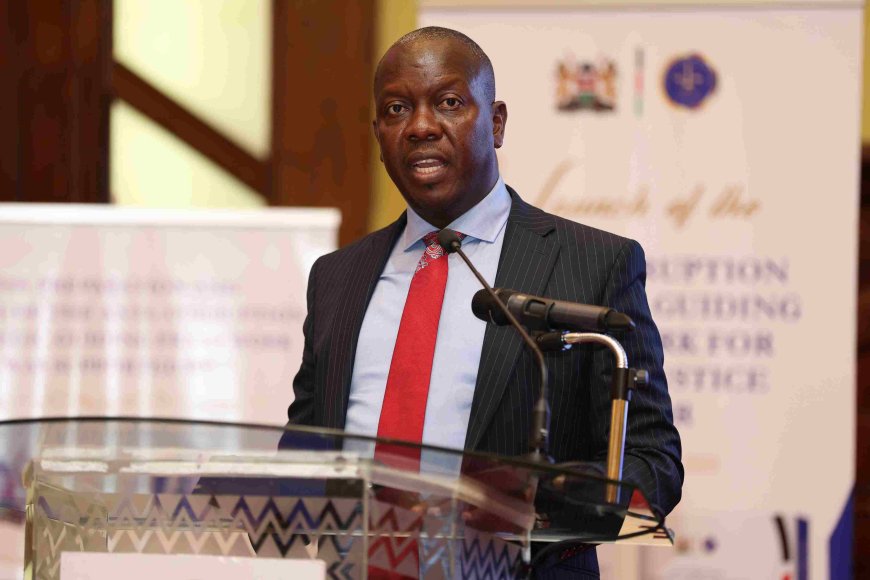CJ Koome Answers ODPP On Her Remarks Influencing Numerous Terrorism Charges
CJ Koome clarified that her comments regarding the protesters who set fire to the Kikuyu Law Courts were specific to that incident alone

Chief Justice Martha Koome has distanced herself from claims by the Office of the Director of Public Prosecutions (ODPP) suggesting her remarks influenced the decision to charge certain protesters with terrorism.
In a press statement issued on Wednesday, CJ Koome clarified that her comments regarding the protesters who set fire to the Kikuyu Law Courts were specific to that incident alone and were not intended to apply broadly to other demonstrations, individuals, or locations.
She reaffirmed that the ODPP operates as an independent institution, whose decisions on whether to press charges cannot be swayed by external influences — even though the ODPP had referenced her remarks while interpreting the Prevention of Terrorism Act earlier in the week.
"My remarks when I visited the site were made in direct response to the attack on the Kikuyu Law Court and reflected the security briefing received at the time. They were specific to that incident and not meant to apply to any other protests, events, individuals, or locations," she stated in part.

Director of Public Prosecutions (DPP) Renson Ingonga speaking at the launch of the NCAJ anti-corruption strategic guiding framework for Kenya’s justice sector on March 25, 2025. /ODPP
"Since then, I have followed public discussions and media commentary about my statement, including one by the Office of the Director of Public Prosecutions (ODPP) on 21st July 2025, which referred to my remarks in relation to cases being pursued under the Prevention of Terrorism Act."
The CJ, however, deemed it important to emphasise that the ODPP is fully independent, as guaranteed by Article 157(10) of the Constitution, meaning that the DPP cannot be directed or influenced by any person or authority.
In addition to the ODPP, the Chief Justice relayed that the National Police Service (NPS) was also an independent institution, particularly during investigations.
"This independence is further protected by internal guidelines, such as the Decision to Charge Guidelines. Likewise, the National Police Service operates independently under the command of the Inspector General, as set out in Article 245(2)(b) of the Constitution, particularly in matters involving investigations. Therefore, all decisions to investigate or prosecute must be based on credible evidence and the law. They are not influenced by public statements made by any individual, including the Chief Justice," she added.
She also referenced the resolutions of a recent National Council on the Administration of Justice (NCAJ) meeting, which brought together various justice sector institutions and aimed to strengthen collaboration in ensuring that law enforcement remains effective, accountable, and in line with constitutional principles.
The participating entities — including the Judiciary, ODPP, National Police Service (NPS), Independent Policing and Oversight Authority (IPOA), civil society organisations, and other oversight bodies — reportedly reaffirmed their commitment to uphold their constitutional duties and serve all Kenyans impartially and without bias.
Her remarks came after ODPP on Monday, July 21, responded to outrage from members of the public concerning the slapping of terrorism charges on individuals.
In its statement, ODPP acknowledged the ongoing national discourse sparked by recent legal actions following the events of June 25, 2025 and July 7, 2025, when protests took place, however, noting that the charges fall under the Prevention of Terrorism Act.
The Renson Ingonga-led office added that preliminary investigations indicate that attacks on public offices, courts, police stations, and government personnel were not spontaneous demonstrations, but calculated and coordinated acts of violence. Additionally, the office stated that the incidents aimed to cripple essential government operations, instil fear, and erode public trust in democratic institutions.
"Chief Justice Hon. Justice Martha Koome, speaking on 26th June 2025 after inspecting the damage at the Kikuyu Law Courts, which was torched during the demonstrations, described that incident as "not merely an act perpetrated by criminal elements but an act of terrorism."," stated ODPP.
"Under Sections 2 and 4 of the Prevention of Terrorism Act, such actions qualify as acts of terrorism when intended to cause serious disruption of essential services, intimidate the public or government, or create widespread fear through targeted destruction."
Since the June 25 memorial protests, authorities have charged dozens of Kenyans with terrorism-related offences, beginning with 37 individuals accused of setting fire to the Kikuyu Law Courts and damaging other government property during the demonstrations.
A few days later, eight more people were charged with terrorism after allegedly torching structures at the Mawego Police Station, where slain teacher Albert Ojwang had been briefly detained before being moved to Nairobi’s Central Police Station.







